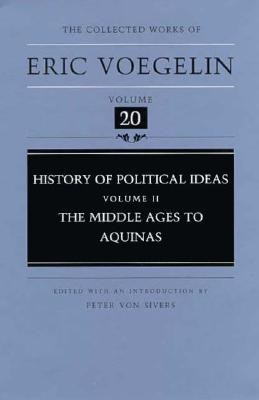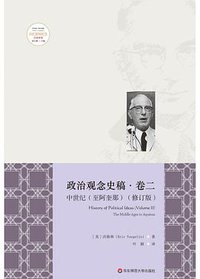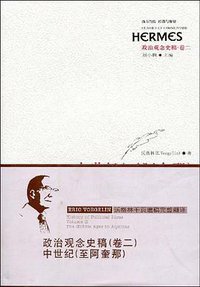History of Political Ideas (Volume 2)
豆瓣
The Middle Ages to Aquinas (Collected Works of Eric Voegelin, Volume 20)
Eric Voegelin / Peter Von Sivers (Editor)
简介
Voegelin's magisterial account of medieval political thought opens with a survey of the structure of the period and continues with an analysis of the Germanic invasions, the fall of Rome, and the rise of empire and monastic Christianity. The political implications of Christianity and philosophy in the period are elaborated in chapters devoted to John of Salisbury, Joachim of Flora (Fiore), Frederick II, Siger de Brabant, Francis of Assisi, Roman law, and climaxing in a remarkable study of Saint Thomas Aquinas's mighty thirteenth-century synthesis.
Although History of Political Ideas was begun as a textbook for Macmillan, Voegelin never intended it to be a conventional chronological account. He sought instead an original comprehensive interpretation, founded on primary materials and taking into account the most advanced specialist scholarship—or science as he called it—available to him. Because of this, the book grew well beyond the confines of an easily marketable college survey and until now remained unpublished.
In the process of writing it, Voegelin himself outgrew the conceptual frame of a "History of Political Ideas," turning to compose Order and History and the other works of his maturity. History of Political Ideas became the ordered collection of materials from which much of Voegelin's later theoretical elaboration grew, structured in a manner that reveals the conceptual intimations of his later thought. As such, it provides an unparalleled opportunity to observe the working methods and the intellectual evolution of one of our century's leading political thinkers. In its embracing scope, History of Political Ideas contains both analyses of themes Voegelin developed in his later works and discussions of authors and ideas to which he did not return or which he later approached from a different angle and with a different emphasis.
The Middle Ages to Aquinas has withstood the test of time. What makes it still highly valuable is its thoroughly revisionist approach, cutting through all the convenient clichés and generalizations and seeking to establish the experiential underpinnings that typified the medieval period.
contents
Part Three. Sacrum Imperium
1. Introduction 29
§1. The General Structure of the Middle Ages 29
§2. The Migrations 30
a. The Germanic Migration Process
b. The Asiatic Migration Process
c. The Germanic Migration Kingdoms
d. Peculiarities of the Frankish Foundation
§3. The Isolation of the West 33
§4. Spiritual Politics 36
§5. Consequences for the Presentation of Ideas 38
A. The Rise of Empire
2. The Germanic Tribes of the Migration 41
§1. General Structure of the Germanic Myth 41
§2. The Frankish Myth 42
§3. The Ostrogoth Myth 43
§4. The Burgundian Myth桾he Myth of the Defeat 45
§5. The Myth of the Defeat in Later German History of Ideas 46
§6. Kingship and National Existence 46
§7 Theory of Kingship in Later French History of Ideas 49
3. The New Empire 52
§1. The Transfer of Empire 52
§2. Gelasius桾he Separation of Spiritual and Temporal Powers 52
§3. The Western Reaction toward the Policy of Constantinople 54
§4. The Breakdown of Byzantine Power in the West 54
§5. The Legal Construction of the Roman Empire in the Migration Period 55
§6. The Rapprochement of the Papacy and the Frankish Power 57
§7. The Coronation of Charlemagne 58
§8. The Donation of Constantine 59
§9. The Territorial Church桾he Capitulary of 802 60
§10. Difference between the Western and Byzantine Dynamics of Empire 61
§11. The Integration of the Persona Regalis into the Mystical Body 62
§12. The Monasteries桾he Rule of Saint Benedict 63
4. The First Reform 65
§1. The Growth of an Evocation 65
a. A Model Case
b. The Tension between Idea and Reality
c. Domination of the Spirit
§2. The Waves of Monastic Reform 68
a. The Reform of Cluny桾he soveriegn Order
b. Anchoritic Reform桽piritual Intenseness
c. The Cistercian Reform桾he Charter of Charity
§3. The Spirit Militant 72
a. The Crusades
b. The Military Orders
aa. The Templars
bb. The Teutonic Order
cc. A Comparison: The Mystic-Warrior Ideal of Kamakura
dd. The Political Soldier
c. The Mendicant Orders
§4. The Investiture Controversy 81
a. Decline and Reform of the Papacy
b. The Problem of Simony桺eter Damian
c. Thge Pataria桞onizo of Sutri
d. The Controversy桺apal and Imperial Arguments
e. Gregory VII
§5. Cardinal Humbert 91
§6. The Tractatus Eboracenses 94
B. The Structure of the Saeculum
5. Introduction 105
§1. The New Forces 105
§2. The Saeculum Renascens 107
§3. The Problem of the Intramundane Order 109
§4. The Principal Questions 111
6. John of Salisbury 113
§1. The New Characterology 113
§2. Feudalism 117
§3. The Commonwealth 121
§4. Tyrannicide 122
7. Joachim of Fiore (Flora) 126
§1. The Structure of Christian History 126
§2. The Three Realms 128
§3. The Constant Elements of the New Political Speculation 130
a. The Meaning of History
b. The Function of the Political Thinker
c. The Leader of the Third Realm
§4. The Brotherhood of Autonomous Persons 132
8. Saint Francis 135
§1.The Praise of Virtues 135
§2. The Life of Poverty 137
§3. The Submission to the Church 138
§4. The Ecclesia of the Laymen 139
§5. The Conformance with Christ桸ature 140
§6. The Intramundane Christ 142
9. Frederick II 144
§1. The Peripeteia of the Empire 144
§2. The Constitutions of Melfi 149
§3. Caesarean Christianity 157
10.The Law 160
§1. Western Law and Roman Law 160
§2. The Myth of Roman Law 162
a. The Ciceronian Stratum of the Myth
b. The Codification of Justinian
aa. The Canonization of Roman Law
bb. The Christian Absolute Order
cc. The Amalgamation of the Roman and Christian Ideas
c. The Lex Generalis 桾he Expositio ad Librum Papiensem
§3. The Bolognese Revival 168
§4. Effects of the Revival 171
a. Influence on Legal Theory
b. Bologna and Imperial Politics
c. The Decretum Gratianum
d. The Constitutions of Melfi and the Extra
§5. The Deliberatio Papae of Innocent III 174
11. Siger de Brabant 178
§1. Aristotelianism 178
§2. Faylasuf 183
a. Greek Preformation of the Problem
b. Neoplatonic Mysticism in Arabic Aristotelianism
c. The Mythical Aristotle
d. The Faylasuf and Islamic Orthodoxy
§3. The Intellectual 187
a. The Western Philosopher and Christianity
b. Faith and Reason
c. The Praise of the Philosopher
d. The Intramundane Unit of the Species
e. Utilitarian Ethics
f. The Structure of Immanent History
g. Ethical Activism
§4. Poverty 198
a. The Ideal of Poverty
b. Gerard of Borgo San Donino桾he Evangelium Aeternum
c. William of Saint Amour桾he Ethics of Work
d. Bertrand of Bayonne桾he Spritual Hierarchy
e. Gérard of Abbeville桾he Episcopal Authority
§5. Conclusion桾he Foundation of the Political Renaissance 204
C. The Climax
12. Saint Thomas Aquinas 52
§1. History 207
a. Truth and Being
b. The Christian Intellectual
c. Faith and Reason
d. Intellectual Propaganda
e. The Hierarchies
f. The Evangelium Aeternum梂estern Imperialism
g. The Historical Mind
§2. Politics 215
a. The Reception of Artistotle桯umanism
b. The Dedication to Cyprus
c. The Prince桪ivine Analogue
d. The Community of Free Christians
e. The Theory of Constitutional Government
§3. Law 223
a. The Four Types of Law
b. The Definition of Law
c. The Theory of Natural Law
d. Human Law桺ositive Law
e. The Old Law桾he Property Society
f. The New Law桱ustification by Faith
§4. Conclusion 231

